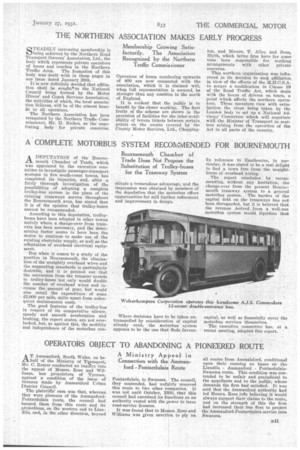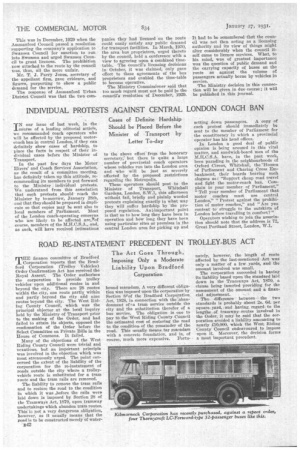OPERATORS OBJECT TO ABANDONING A PIONEERED ROUTE
Page 59

Page 60

If you've noticed an error in this article please click here to report it so we can fix it.
A Ministry Appeal in Connection with the Ammanford Poritardulais Route AT Ammanford, South Wales, on hehalf of the Ministry of Trsinsport. Mr. C. Romer conducted an inqu'lry into the appeal of Messrs. Rees and Williams, bus proprietors of Tycroes, against a condition of the issue of licences made by Ammanford Urban District Council.
The plaintiffs' case was that, whereas they were pioneers of the AmmanfordPontardulais route, the council had banned them from this route and its projections, on the western end to Lienduo, and, in the other direction, beyond Pontardulais, to Swansea. The council, they contended, had unfairly reserved this route to two other companies. It was not until October, 1930, that this council had exercised its functions as an authority vested with the power to issue road-service licences.
It was found that to Messrs. Rees and Williams was given sanction to ply on
all routes from Amnia-Ilford, conditional upon their running no buses on the Llandilo Ammanford PontardulaisSwansea route. This condition was contended to be unfair and prejudicial to the appellants and to the public, whose demands the firm had satisfied. It was said that the Ammanford authority had led Messrs. Rees into believing it would always support their claims to the route, and on the strength of this the firm had increased their bus fleet to project the Ammanford-Pontardulais service into Swansea.
This was in December, 1929 when the Ammanford Council passed a resolution supporting the company's application to Swansea Council for sanction to run into Swansea and urged Swansea Council to grant licences. The prohibition now attached to the route by the council was, thus, all the more unfair.
Mr. T. 5. Parry Jones, secretary of the appellant firm, gave evidence, and figures, purporting to stow a public demand for the service.
The response of Ainmanford Urban District Council was that the two corn
panies they had licensed on the route could easily satisfy any public demand for transport facilities. In March, 1920, the area bus proprietors, urged thereto by the council, held a conference with a view to agreeing upon a combined timetable. The council's licensing decisions in October, it was claimed, only gave effect to these agreements of the bus proprietors and enabled the time-table to become operative.
The Ministry Commissioner said that too much regard must not be paid to the council's resolution of December, 1929. It had to be remembered that the council was not then acting as a licensing authority and its view of things might alter considerably when the council itself came to licence services. What, to his mind, was of greatest importance was the question of public demand and the carrying capacity of buses on the route as against the volume of passengers actually borne by vehicles in service.
The Ministry decision in this connection will be given in due course ; it will be published in this journal.




































































































